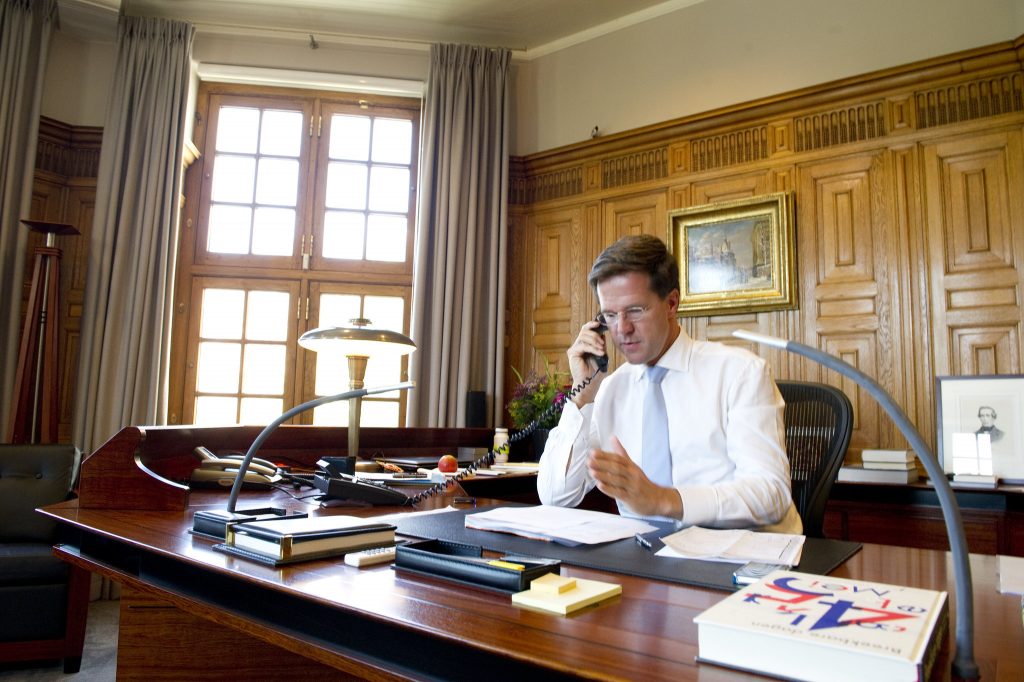Why Dutch PM Rutte’s Address Was Historical Posted by Sten on Mar 17, 2020 in Dutch Vocabulary, News
The coronavirus is spreading across the world fast. Maandagavond (Monday evening) at 7 pm, minister-president (prime minister) Mark Rutte addressed the Dutch people from the Torentje (little tower), which is the office of the Dutch premier (prime minister). He addressed zorgen (concerns) about the virus and what the Dutch overheid (government) is considering. Here’s what he said and why it was a historic moment for the Netherlands.
An Address to the Nation
During his toespraak (address, speech), Rutte said:
De opgave waar we voor staan is heel groot. Samen komen we deze moeilijke periode te boven. Let een beetje op elkaar. Ik reken op u. (The task that is before us is very big. Together we will overcome this difficult time. Pay attention to each other. I am counting on you.)
He was asking for begrip voor de zorgen van ouderen (understanding for the concerns of the elderly); to listen to adviezen van deskundigen (advice from experts); that veel mensen besmet zullen raken, maar de meeste met lichte klachten (many people will be infected, but most people with light complaints) and het land gaat niet langdurig op slot (the country will not go in lockdown for a long time).
You can see the whole speech above. In the comments you can find a transcript in English of it all, so that helps to understand it all!
As of today, March 17, the total number of positief geteste mensen (people tested positive) is 1453, the number of doden (deaths) is 24.
However, the Dutch government hesitates to put the country into lockdown. The Netherlands is an open land (open country), and the damage to the economy of locking down the country for a very long time is onverantwoord (irresponsible), they say. However, maatregelen to reduce social contact should be embraced as much as possible, and schools are closed for several weeks. Sociale onthouding (“social abstinence” – social distancing) is also recommended, and thuiswerken (working from home) is done where possible. And of course: handen wassen, handen wassen, handen wassen!
Een Historische Toespraak
https://www.youtube.com/watch?v=rj-jivW3-Ac
A toespraak from the office of the minister-president is very rare. While the koning (king) speaks to the country every year on prinsjesdag (Prince’s Day), the minister-president, if anything, holds persconferenties (press conferences) to tell the public about the plannen (plans) of the kabinet (cabinet).
But a toespraak directly from the premier? That’s exceptional. The last time that the premier addressed the nation like this was in 1973, when former minister-president Joop Den Uyl informed the public of maatregelen (measures) taken to deal with the oliecrisis (oil crisis) of the early 1970s. He opened immediately with a big maatregel: Goedenavond. Gisteren heeft de regering besloten dat vanaf 7 januari benzine alleen nog op de bon te krijgen zal zijn. (Good evening. Yesterday, the government decided that from January 7, fuel will only be available with coupons.)
That Rutte’s toespraak was bijzonder (special) is also reflected in the kijkcijfers (ratings): 7 of the 17 million Dutch saw the toespraak live on TV!
Why are such Addresses to the Nation so rare in the Netherlands?
Rutte is only the fifth premier after the Second World War to address the nation in times of peril. There are speeches when a vorst (monarch) leaves office, but those are in line with expectations.
So it’s been almost 50 years since we had a toespraak like this! They are not as common as in the United States, for example. It is part of the Dutch culture of soberness and the different role that the premier plays than the president in other countries. The koning is more responsible for pulling people together and speaking to all, and the political and policy side of things is left to discuss by the kabinet. And Rutte leads that part. But because that is less plechtig (ceremonious), these kinds of toespraken are rare. But in serious situations, they can help emphasize the seriousness.
What do you think about this toespraak? How has your country reacted to this situation? Let me know in the comments below!

Build vocabulary, practice pronunciation, and more with Transparent Language Online. Available anytime, anywhere, on any device.




